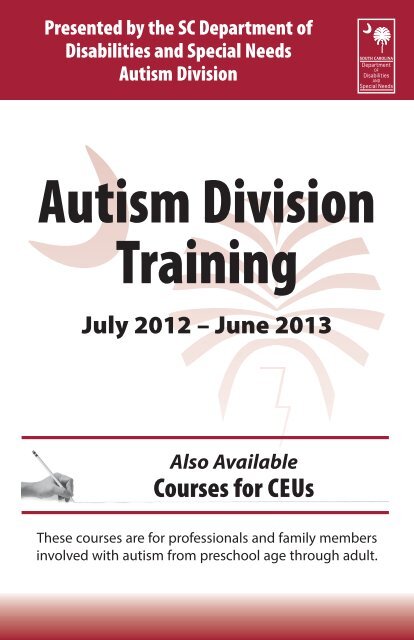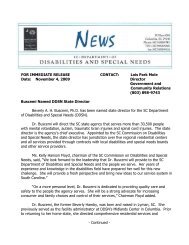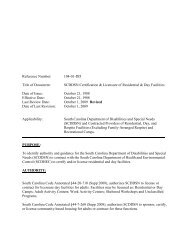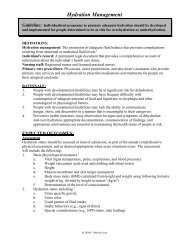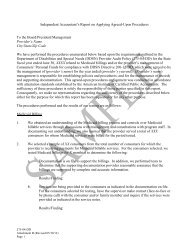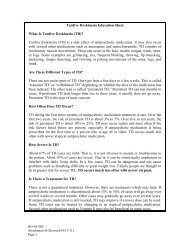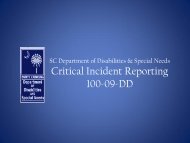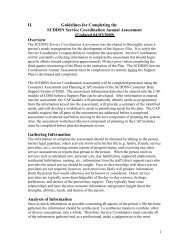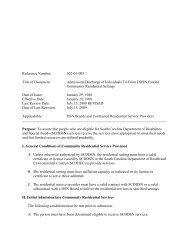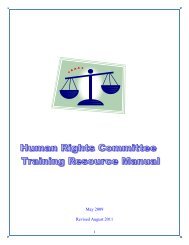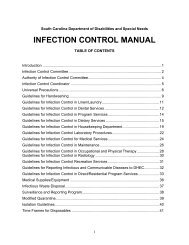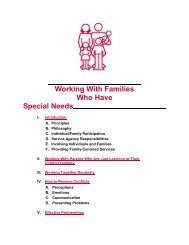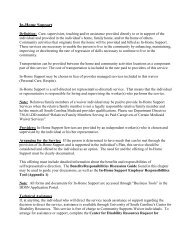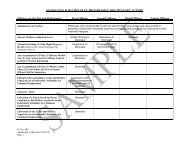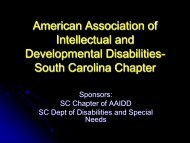Autism Division Training - South Carolina Department of Disabilities ...
Autism Division Training - South Carolina Department of Disabilities ...
Autism Division Training - South Carolina Department of Disabilities ...
Create successful ePaper yourself
Turn your PDF publications into a flip-book with our unique Google optimized e-Paper software.
Presented by the SC <strong>Department</strong> <strong>of</strong><strong>Disabilities</strong> and Special Needs<strong>Autism</strong> <strong>Division</strong><strong>Autism</strong> <strong>Division</strong><strong>Training</strong>July 2012 – June 2013Also AvailableCourses for ceusThese courses are for pr<strong>of</strong>essionals and family membersinvolved with autism from preschool age through adult.<strong>Autism</strong> booklet 2012.indd 17/24/2012 12:13:32 AM
Who is the <strong>Autism</strong> <strong>Division</strong>?The <strong>Autism</strong> <strong>Division</strong> is the branch <strong>of</strong> the <strong>Department</strong> <strong>of</strong> <strong>Disabilities</strong>and Special Needs that handles issues regarding individuals withautism and the people who deal with them on a regular basis.The three main service areas <strong>of</strong> the <strong>Autism</strong> <strong>Division</strong> are Diagnosis,Consultation, and <strong>Training</strong>. <strong>Autism</strong> <strong>Division</strong> <strong>of</strong>fices are located inSpartanburg, Columbia, Florence, and Charleston.One <strong>of</strong> the <strong>Autism</strong> <strong>Division</strong>’s primary missions is to provide effectivetraining to families, pr<strong>of</strong>essionals and other people involved withindividuals with autism. The ultimate goal <strong>of</strong> all <strong>Autism</strong> <strong>Division</strong>training is to improve the lives <strong>of</strong> people with autism living in<strong>South</strong> <strong>Carolina</strong>.Frequently Asked Questions1 How will this training make my job easier?For family members, classroom teachers and otherpeople providing direct services.Learn:— what autism is and how it affects behavior.— why some strategies work best.— how to design effective treatment strategies.— how to perform teaching techniques.For School Administrators, DSN ProviderBoard Supervisors and others involved withdeveloping service plans.Learn:— the importance <strong>of</strong> certain approaches.— how to individualize effective treatment plans.— how to help people with autism achieve their Outcomes.1<strong>Autism</strong> booklet 2012.indd 17/24/2012 12:13:33 AM
Basic Treatment StrategiesThis three-day training session presents basic information aboutautism, and about treatment strategies, which have proven to beeffective with people who have autism. <strong>Training</strong> sessions will bea combination <strong>of</strong> lecture and small group activities. Registrationrequired.Toilet <strong>Training</strong>Many parents are unsure about when to start toilet teaching or“potty training.” Not all children are ready at the same age; so it’simportant to recognize the signs <strong>of</strong> readiness. This training willpresent basic information about toilet readiness and strategies thathave been successful with children who have autism. Registrationrequired.Community Based <strong>Training</strong>This two-to-three day training session teaches a process todevelop a person specific training plan targeted for particularcommunity locations. Examples <strong>of</strong> such plans include: groceryshopping, ordering at a fast food restaurant, sitting at a fast foodrestaurant, attending movies, attending department stores,attending community and restaurant parks-play rooms, or using aLaundromat. Techniques and procedures taught are also applicablein vocational and residential settings. <strong>Training</strong> involves lecture,discussion and taking consumers with autism into the communityin order to design specific training plans. Due to the onsite trainingthat will be necessary in the community, and instructors neededfor one individual, only a specific number <strong>of</strong> participants will beaccepted. Registration required.Teaching Play SkillsAn integral part <strong>of</strong> child development is play. Through play childrenlearn social skills, social language and cognitive enrichment. Inthis training family members and pr<strong>of</strong>essionals will gain basicinformation on child directed and adult support play strategies.Registration required.4<strong>Autism</strong> booklet 2012.indd 47/24/2012 12:13:35 AM
Dealing with Problem BehaviorThis training provides information about autism and teachingstrategies to use in the home and in the community for addressingbehavioral issues. Strategies will include structuring, visual supportsand reinforcement. Registration required.Sessions That Require Prerequisite <strong>Training</strong>Designing Daily SchedulesPlanning and organizing the events and activities <strong>of</strong> the day is <strong>of</strong>major importance to a person with autism. The one-day trainingsession covers principles, strategies and a process for designinga daily schedule for one or more people with autism. Attendeeswill demonstrate competency by either revising a current dailyschedule for a person with autism or designing a new one. Beforeattending this training session people must have completed either BasicTreatment Strategies or Supporting Adults with <strong>Autism</strong>. Registrationrequired.DataAccurate data collection and its correct analysis is an essential part<strong>of</strong> applied behavior analysis (ABA). This one-day training sessionpresents several basic data collection techniques. Competencyis validated by identifying data collection systems, recording,graphing and analyzing data. Before attending this training sessionpeople must have completed either Basic Treatment Strategies orSupporting Adults with <strong>Autism</strong>. Registration required.Communication ProgramsImpairments in communication is one <strong>of</strong> the main difficulties forpeople with autism. This one-day training session has two phases.The first phase teaches people how to assess the communicationskills and needs <strong>of</strong> a person with autism. The second phasetrains people to use the assessment information to design acommunication program specific to the individual. Competencyis validated by the quality <strong>of</strong> the Communication Plan designed.Before attending this training session people must have completedeither Basic Treatment Strategies or Supporting Adults with <strong>Autism</strong>.Registration required.5<strong>Autism</strong> booklet 2012.indd 57/24/2012 12:13:35 AM
Visual SupportsVisual Supports are an effective method in assisting people withautism be more independent and display appropriate behavior.This one-day training session teaches attendees how to select anddesign a visual support(s) for a person with autism. Competencyis validated by the quality <strong>of</strong> the Visual Support designed. Beforeattending this training session people must have completed either BasicTreatment Strategies or Supporting Adults with <strong>Autism</strong>. Registrationrequired.Designing Social Skills <strong>Training</strong> for People with <strong>Autism</strong>Impairments in social skills is one so the maim difficulties for peoplewith autism. This one-day training session has two phases. Thefirst phase teaches people to assess the social skills and needs <strong>of</strong>a person with autism. The second phase trains people to use theassessment information to design a social skills training plan specificto the individual. Competency is validated by the quality <strong>of</strong> theSocial Skills <strong>Training</strong> designed. Before attending this training sessionpeople must have completed either Basic Treatment Strategies orSupporting Adults with <strong>Autism</strong> or ABBIS. Registration required.Early Interventionist <strong>Training</strong> for <strong>Autism</strong>: Setting UpHome ProgramsThis two-day training involves lecture, discussion and roleplay. Attendees are given materials and training to developa home program for a pre-school age child with autism orsimilar communicative disability. Part <strong>of</strong> the materials include adevelopmental chart to assist in expanding the program as the childlearns skills. Competency is validated by the quality <strong>of</strong> work sessiondesigned and the demonstration <strong>of</strong> a minimum number <strong>of</strong> basicteaching skills and techniques in role-play settings. Before attendingthis training session people must have completed either Introduction to<strong>Autism</strong> or One-day Early Intervention training. Registration required.Developing Social StoriesSocial Stories are a tool for teaching social skills to children andadults with autism and related disabilities. This training will assistyou in the steps <strong>of</strong> writing and implementing a Social Story. Beforeattending this training session people must have completed Intro to<strong>Autism</strong> or One-day Early Intervention training. Registration required.6<strong>Autism</strong> booklet 2012.indd 67/24/2012 12:13:35 AM
Addressing Aberrant BehaviorsThis training will present a process for identifying and addressing aberrantbehaviors. Activities will be related to describing, analyzing and identifyingcommunicative issues related aberrant behaviors.Circle Graph and ProgrammingThis training will present two complementary approaches to programming,which are the Circle Graph and Behavioral Programming. The CircleGraph will be used as a framework for designing programming to be ageappropriateand functional, and as a means to analyze programmaticproblems and concerns. The basic behavior paradigm (antecedentbehavior-consequence)will be used as a means to increase appropriateskills and behavior, decrease inappropriate behaviors, and analyze a variety<strong>of</strong> programmatic issues.Communication & SocializationThis training will present information related to communication andsocialization issues regarding person’s with autism, as well as specificstrategies that have shown to be effective for improving communicationand socialization skills for these individuals.The <strong>Training</strong> Calendaris also available onlineat the DDSN website,http://www.ddsn.sc.gov/consumers/divisions/Pages/<strong>Autism</strong>.aspx7<strong>Autism</strong> booklet 2012.indd 77/24/2012 12:13:36 AM
<strong>Training</strong> Schedule for Each <strong>Autism</strong> OfficeFlorence <strong>Autism</strong> <strong>Division</strong>CourseDateSLEPA 8/15-16/2012Basic Treatment Strategies 9/10-12/2012Strategies for Parents: Young Children with 9/25/2012<strong>Autism</strong>Eliciting Communication at School, Home & 10/2/2012CommunityStrategies for Parents: Getting Through the 11/13/2012Holidays in an Autistic WorldAccessing <strong>Autism</strong> <strong>Division</strong> Services 12/3/2012EI <strong>Training</strong>: The Series 1/8, 22/2013Basic Treatment Strategies 1/29-31/2013Introduction to <strong>Autism</strong> 2/4/23013EI <strong>Training</strong>: The Series 2/5, 19/2013EI <strong>Training</strong>: The Series 3/5, 19/2013Strategies for Parents: Dealing with a3/7/2013Teenager and <strong>Autism</strong><strong>Autism</strong> Fair for Service Providers 4/4/2013EI <strong>Training</strong>: The Series 4/9, 23/2013This training calendar is also available onlineat the DDSN website:http://www.ddsn.sc.gov/consumers/divisions/Pages/<strong>Autism</strong>.aspx8<strong>Autism</strong> booklet 2012.indd 87/24/2012 12:13:36 AM
<strong>Training</strong> Schedule for Each <strong>Autism</strong> OfficeSpartanburg <strong>Autism</strong> <strong>Division</strong>CourseIntro To <strong>Autism</strong> 8/23/12Basic Treatment Strategies 9/6,13,20/12Parent <strong>Training</strong> 10/4/12Visual Supports 10/25/12EI <strong>Training</strong> 11/15/12Social Stories 1/17/13Basic Treatment Strategies 2/7,14,21/13Parent <strong>Training</strong> 3/14/13Communication 4/18/13DateCourseCoastal <strong>Autism</strong> <strong>Division</strong>9DateABBIS 7/16-20/2012Potty <strong>Training</strong> 8/2/2012Intro to <strong>Autism</strong> 8/15/2012Dealing with Problem Behavior at 9/14/2012Home and CommunityBasic Treatment Strategies 10/17 -19/2012Intro to <strong>Autism</strong> 11/7/2012Basic Treatment Strategies 1/23 -25/2013Intro to <strong>Autism</strong> 2/1/2013Dealing with Problem Behavior at 2/15/2013Home and CommunityTransition <strong>Training</strong> 3/13/2013Potty <strong>Training</strong> 4/12/2013Intro to <strong>Autism</strong> 5/15/2013Basic Treatment Strategies 6/19 -21/2013<strong>Autism</strong> booklet 2012.indd 97/24/2012 12:13:36 AM
<strong>Training</strong> Schedule for Each <strong>Autism</strong> OfficeColumbia <strong>Autism</strong> <strong>Division</strong>CourseDateIntroduction to <strong>Autism</strong> 8/2/2012Basic Treatment Strategies 9/10, 17 and 24/ 2012Introduction for Early Interventionists 10/9/2012Visual Supports 11/1/2012Parent <strong>Training</strong> 12/7/2012Aberrant Behaviors 1/24/2013Introduction to <strong>Autism</strong> 2/25/2013Teaching Techniques-Strategies 3/27/2013Basic Treatment Strategies 4/24, 25, 26/2013Community Based <strong>Training</strong> – for5/16, 23, 30/2013Elementary Aged Children••Please note that training sessions may be cancelled if there is aninsufficient number <strong>of</strong> applicants.••Please note that after you submit your training registration, afterreceiving an e-mail acceptance letter, you must confirm that you aregoing to attend the specific training session by the designated deadlineor you will lose your slot.••Please note that due to the size <strong>of</strong> our training room, we can onlyaccept a specific number <strong>of</strong> participants in each session.10<strong>Autism</strong> booklet 2012.indd 107/24/2012 12:13:36 AM
Suggestion: Photocopy this 2-page form. Complete the copied form and keep this brochure intact.<strong>Autism</strong> <strong>Division</strong> <strong>Training</strong>General Registration FormUse for all courses except ABBIS.Pr<strong>of</strong>essionals: use one registration form per person.Family Members: can use one registration for more than one person.Send completed registration to the appropriate <strong>Autism</strong> <strong>Division</strong> Office (see page 13).The same form can be used for more than one training if the same <strong>of</strong>fice conducts allthe selected training. Note: Sending this form does not guarantee acceptance. You willbe contacted by the <strong>Autism</strong> <strong>Division</strong> upon acceptance.Name: _______________________________________________________Check one: I am a ___ Family member <strong>of</strong> a person with autism ___ Pr<strong>of</strong>essionalPr<strong>of</strong>essionals complete #1 through #4. Family members complete #4.1. Position: ___________________________________________________2. Employer: __________________________________________________3. Work Address Street:____________________________________________City: ________________________ County: _______________Zip: _____________ Work Phone #: ______________________Work E-mail: ________________________________________4. Home Address Street:____________________________________________City: ________________________ County: _______________Zip: _____________ Home Phone #: ______________________Home E-mail: ________________________________________12<strong>Autism</strong> booklet 2012.indd 127/24/2012 12:13:37 AM
Course SelectionFor all courses having a prerequisite: Using number in the list below, list the prerequisitecourse you have attended with the date and place.1. One-day Introduction to <strong>Autism</strong> 3. Supporting Adults with <strong>Autism</strong>2. Basic Treatment Strategies 4. Early Interventionist <strong>Training</strong> (Introduction)<strong>Training</strong> Requested Dates Locations PrerequisiteService to People with <strong>Autism</strong>Pr<strong>of</strong>essionals: How many people with autism do you serve, either directly or indirectly?Briefly describe how your job function helps people with autism.Family members: Please describe how you are providing help to your family memberwith autism.________________________________________________________________________________________________________________________________________________________________________________________________________________________________________Why I Wish to Attend These CoursesBriefly describe why you want to attend the training you requested and how you think it willhelp you in the performance <strong>of</strong> your job or in the aid <strong>of</strong> your family member with autism.______________________________________________________________________________________________________________________________________________________________________________Do you need assistance? Yes No If yes, please describe:____________________________________________________________________________________________________________________Sending this application is not a guarantee <strong>of</strong> acceptance. You will becontacted regarding acceptance and further details.13<strong>Autism</strong> booklet 2012.indd 137/24/2012 12:13:37 AM
<strong>Autism</strong> <strong>Division</strong> OfficesFax or Mail to <strong>Autism</strong> <strong>Division</strong> Officeas Indicated for Selected <strong>Training</strong>Columbia <strong>Autism</strong> <strong>Division</strong> OfficeMidlands Center8301 Farrow RoadColumbia, SC 29203803-935-5090 (<strong>of</strong>fice)803-935-7135 (fax)Spartanburg <strong>Autism</strong> <strong>Division</strong> Office269 S. Church St., Suite 309Spartanburg, SC 29306864-594-4907 (<strong>of</strong>fice)864-594-4923 (fax)Charleston <strong>Autism</strong> <strong>Division</strong> OfficeCoastal Center9555 Miles Jamison RoadSummerville, SC 29485843-832-5561 (<strong>of</strong>fice)843-832-5560 (fax)Florence <strong>Autism</strong> <strong>Division</strong> OfficePee Dee Center714 National Cemetery RoadFlorence, SC 29506843-664-2720 (<strong>of</strong>fice)843-664-2735 (fax)<strong>Autism</strong> <strong>Division</strong> Central Office<strong>South</strong> <strong>Carolina</strong> <strong>Department</strong> <strong>of</strong> <strong>Disabilities</strong> and Special Needs3440 Harden Street ExtensionPO Box 4706Columbia, SC 29240803-898-9609 (<strong>of</strong>fice)803-898-9653 (fax)14<strong>Autism</strong> booklet 2012.indd 147/24/2012 12:13:37 AM
Notes15<strong>Autism</strong> booklet 2012.indd 157/24/2012 12:13:37 AM
<strong>Autism</strong> booklet 2012.indd 167/24/2012 12:13:37 AM
<strong>Autism</strong> booklet 2012.indd 37/24/2012 12:13:37 AM
S.C. <strong>Department</strong> <strong>of</strong> <strong>Disabilities</strong>and Special Needs<strong>Autism</strong> <strong>Division</strong>P.O. Box 4706Columbia, SC 29240<strong>Autism</strong> booklet 2012.indd 47/24/2012 12:13:38 AM


